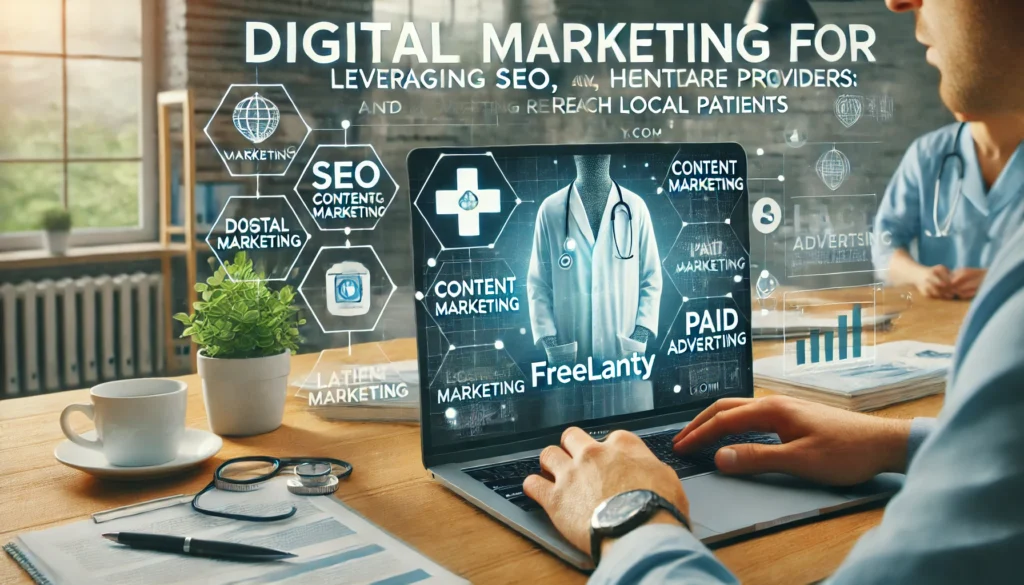







In the rapidly evolving healthcare industry, digital marketing has become an essential tool for providers looking to reach and engage local patients. Whether you run a clinic, dental office, or specialized healthcare practice, leveraging digital marketing strategies such as SEO, content marketing, and paid advertising can significantly enhance your visibility, build trust with potential patients, and ultimately drive growth. This guide will explore how healthcare providers can effectively implement these strategies to reach more local patients and improve their online presence.
For healthcare providers, reaching local patients is a top priority. Digital marketing allows you to target potential patients in your immediate vicinity who are searching for healthcare services. By optimizing your online presence and using targeted advertising, you can ensure that your clinic or practice appears in front of the right audience when they need your services most.
Trust is a cornerstone of the healthcare industry. Patients need to feel confident in their healthcare providers before booking an appointment. Digital Marketing for healthcare offers various ways to build and reinforce this trust, from sharing informative content and patient testimonials to maintaining an active and transparent online presence. Establishing yourself as a credible and reliable provider through digital channels can make a significant difference in attracting new patients.
Engaging with patients beyond the clinic is essential for maintaining strong relationships and encouraging repeat visits. Digital marketing enables healthcare providers to keep patients informed, answer their questions, and provide valuable health information through various channels like email, social media, and blog posts. This continuous engagement helps keep your practice top-of-mind and fosters a loyal patient base.
Local SEO is crucial for healthcare providers because most patients search for services near their location. To optimize for local search, ensure your website includes location-specific keywords, such as “dentist in [city]” or “family clinic near me.” Additionally, claim and optimize your Google My Business (GMB) profile with accurate information, high-quality photos, and patient reviews to appear in local search results and Google Maps.
On-page SEO involves optimizing individual pages on your website to improve search engine rankings. For healthcare providers, this means including relevant keywords in titles, meta descriptions, headers, and content. Use clear, descriptive URLs and ensure your site structure is logical and easy to navigate. Additionally, optimize images with alt texts and ensure your content is accessible to all users.
When optimizing for search, focus on medical-specific keywords that patients might use when searching for your services. This includes conditions you treat, treatments you offer, and services you provide. For example, a dental office might optimize for terms like “teeth whitening,” “root canal treatment,” or “emergency dentist.” Use tools like Google Keyword Planner or SEMrush to identify high-volume keywords relevant to your practice.
Google My Business is a powerful tool for enhancing your local SEO. Ensure your GMB profile is complete and regularly updated with your business hours, contact information, services, and high-quality photos. Encourage patients to leave reviews on your GMB profile, as positive reviews can boost your ranking in local search results and make your practice more appealing to potential patients.
Blogging is an effective way to provide valuable information to your patients while improving your SEO. Write blog posts on topics that address common patient concerns, provide health tips, or explain medical procedures. For example, a clinic could write about “What to Expect During Your First Visit” or “How to Manage Diabetes.” Regularly publishing informative content helps establish your practice as an authority in the healthcare field and attracts more visitors to your website.
Video content is highly engaging and can help you connect with patients on a more personal level. Create videos that introduce your healthcare team, explain medical procedures, or provide health tips. Videos can be shared on your website, social media, and YouTube, reaching a broader audience and making complex information more accessible to patients.
Educational content is particularly important in digital marketing for healthcare. Create content that educates patients about their health, preventative care, and treatment options. This can include detailed guides, infographics, and FAQs that address common questions. Educating your patients not only helps them make informed decisions but also builds trust in your expertise.
Sharing regular health tips through blog posts, social media, or email newsletters can keep your patients engaged and informed. These tips can cover a wide range of topics, from seasonal health advice to everyday wellness practices. By providing actionable advice, you can position your practice as a go-to resource for health information.
Case studies showcase real-life examples of how your practice has helped patients achieve positive health outcomes. Highlight specific cases where your treatment made a significant difference, detailing the patient’s initial condition, the treatment process, and the results. Case studies provide social proof and demonstrate the effectiveness of your services, helping to build credibility with potential patients.
Google Ads is a powerful tool for healthcare providers looking to attract more local patients. With Google Ads, your practice can appear at the top of search results when potential patients search for services like yours. Use relevant keywords, such as “urgent care clinic near me” or “best pediatrician in [city],” to target your ads. Google Ads also allows you to set a budget and pay only when someone clicks on your ad, making it a cost-effective way to reach more patients.
Social media platforms like Facebook, Instagram, and LinkedIn offer robust advertising options that allow healthcare providers to target specific demographics, such as age, location, and interests. Use social media ads to promote your services, share patient testimonials, or announce special events. For example, a dental office might run a Facebook ad campaign promoting a seasonal teeth whitening special. Social media ads can help you reach a larger audience and drive traffic to your website or booking page.
Retargeting is a highly effective strategy that allows you to re-engage with potential patients who have previously visited your website but didn’t book an appointment. By displaying targeted ads to these users as they browse other websites or social media, you can remind them of your services and encourage them to return and schedule a visit. Retargeting can be particularly useful in healthcare, where patients may need time to research and consider their options before making a decision.
When budgeting for paid advertising in digital marketing for healthcare, it’s important to consider the potential return on investment (ROI). Start with a budget that aligns with your overall marketing goals, and monitor the performance of your campaigns closely. Track metrics such as click-through rates (CTR), cost per click (CPC), and conversion rates to determine the effectiveness of your ads. Adjust your budget and targeting as needed to maximize your ROI and attract more patients to your practice.
Your website is the cornerstone of your online presence. It should be professionally designed, easy to navigate, and optimized for search engines. Include detailed information about your services, staff, and locations. Make sure your contact information is easily accessible and that patients can quickly find the information they need. Additionally, consider integrating an online booking system to allow patients to schedule appointments directly through your website.
With many patients using mobile devices to search for healthcare providers, it’s essential that your website is mobile-friendly. A mobile-optimized website should load quickly, be easy to navigate, and display content clearly on smaller screens. Ensure that your online booking system and contact forms are also mobile-friendly, making it easy for patients to book appointments or reach out to your practice from their smartphones.
Integrating an online booking system into your website can greatly enhance the patient experience. Online booking allows patients to schedule appointments at their convenience, without having to call the office. This not only improves patient satisfaction but also reduces the workload for your administrative staff. Choose a booking system that syncs with your practice’s calendar and sends automated reminders to reduce no-shows.
Patient reviews are a critical component of your online reputation. Positive reviews can significantly influence potential patients’ decisions when choosing a healthcare provider. Encourage satisfied patients to leave reviews on platforms like Google, Yelp, and Healthgrades. Display these reviews prominently on your website to build trust with potential patients. Additionally, respond to reviews, both positive and negative, to show that you value patient feedback and are committed to providing excellent care.
Not all social media platforms are equally effective for healthcare providers. Facebook and Instagram are popular choices for reaching a broad audience, while LinkedIn is ideal for networking with other healthcare professionals in digital marketing for healthcare. Choose platforms where your target audience is most active and focus your efforts on building a strong presence there. For example, a pediatric clinic might find Instagram effective for sharing child health tips and engaging with parents.
To keep your audience engaged on social media, share a variety of content that provides value and showcases your expertise. Post health tips, patient testimonials, behind-the-scenes looks at your practice, and educational content on common medical conditions. Interactive content, such as polls, Q&A sessions, and live videos, can also boost engagement and foster a sense of community among your followers.
Social media is not just a platform for sharing content; it’s also a valuable tool for interacting with patients. Respond promptly to messages, comments, and inquiries from patients. Address their concerns, provide helpful information, and encourage them to contact your office if they need further assistance. Active engagement on social media can help build trust and make your practice more accessible to potential patients.
Building a robust email list is essential for maintaining ongoing communication with your patients. Collect email addresses through your website, online booking system, and in-office visits. Offer incentives, such as a free health guide or exclusive access to special events, to encourage patients to subscribe to your email list.
Email newsletters are an effective way of digital marketing for healthcare to keep your patients informed and engaged. Send regular newsletters that include health tips, practice updates, upcoming events, and personalized content based on patient interests. For example, a dental office could send newsletters with tips on oral hygiene, reminders for routine check-ups, and information about new services.
Automated appointment reminders are a simple yet effective way to reduce no-shows and ensure that patients attend their scheduled visits. Send reminders via email a few days before the appointment, and include important details such as the date, time, location, and any necessary preparations. This not only helps patients keep track of their appointments but also improves the overall efficiency of your practice.
Personalization is key to effective email marketing. Use your patient data to send targeted emails that address specific needs and interests. For example, send follow-up emails after appointments with personalized health advice or recommendations for additional services. Personalized communication helps build stronger relationships with your patients and encourages repeat visits.
Online reviews are often the first impression potential patients have of your practice. Positive reviews can significantly impact your reputation and attract new patients, while negative reviews can deter them. Actively managing your online reviews is crucial for maintaining a positive image and building trust with potential patients.
Responding to online reviews shows that you value patient feedback and are committed to providing excellent care. Thank patients for positive reviews and address any concerns raised in negative reviews in a professional and empathetic manner. Offering solutions or inviting the patient to discuss their concerns further can help resolve issues and demonstrate your commitment to patient satisfaction.
Encourage satisfied patients to leave positive reviews on platforms like Google, Yelp, and Health grades. You can do this by including a gentle reminder on your website, in follow-up emails, or in-office materials. Consider offering a small incentive, such as a discount on future services, to motivate patients to share their positive experiences online.
With more patients searching for healthcare providers on mobile devices, ignoring mobile optimization can lead to a poor user experience, lower search rankings, and lost opportunities. Ensure that your website is fully responsive, loads quickly, and provides a seamless experience on mobile devices.
Local SEO is essential for healthcare providers looking to attract nearby patients. Failing to optimize your website and content for local search terms can result in lower visibility in search results and fewer patient inquiries to digital marketing for healthcare. Focus on local SEO strategies, such as optimizing your Google My Business profile and including location-specific keywords in your content.
Consistency in messaging is key to building a strong brand identity. Ensure that your visual and messaging style is consistent across all digital platforms, from your website to social media profiles and online ads. Inconsistent branding can confuse potential patients and weaken your practice’s impact. Develop brand guidelines to maintain consistency in all your marketing efforts.
Artificial intelligence (AI) and automation are transforming digital marketing in the healthcare industry. AI can help healthcare providers analyze patient data, predict trends, and personalize marketing messages. Automation tools can streamline tasks such as email marketing, social media posting, and appointment reminders, allowing providers to focus more on patient care.
As telehealth continues to grow in popularity, integrating telehealth services into your digital marketing for healthcare strategy is crucial. Promote your telehealth offerings on your website, social media, and email campaigns. Provide clear information on how patients can access these services and what to expect during a virtual visit.
Personalization will continue to be a major trend in healthcare marketing. Patients expect personalized experiences tailored to their needs and preferences. Leveraging patient data and AI-driven tools can help healthcare providers deliver highly personalized care, from tailored health advice to customized communication. This level of personalization not only enhances patient satisfaction but also builds long-term loyalty.
Digital marketing is crucial for healthcare providers because it helps them reach local patients, build trust, and engage with their audience. Effective digital marketing strategies, including SEO, content marketing, and paid advertising, are essential for attracting new patients and growing your practice.
Healthcare providers can use SEO by optimizing their website for local search terms, improving on-page SEO, and optimizing for medical-specific keywords. Additionally, claiming and optimizing a Google My Business profile can increase visibility in local search results.
Content marketing benefits healthcare providers by providing valuable information to patients, improving SEO, and building trust. Creating content such as blog posts, videos, and patient education materials helps establish your practice as an authority in the healthcare field.
Paid advertising allows healthcare providers to target specific demographics and reach potential patients actively searching for healthcare services. Platforms like Google Ads and social media ads offer targeted advertising options that can drive traffic to your website and increase patient inquiries.
Future trends include the use of AI and automation for personalized marketing, the integration of telehealth services into digital marketing strategies, and delivering highly personalized patient experiences based on patient data.
Digital Marketing for healthcare offers providers powerful tools to attract and engage local patients, build trust, and grow their practices. By leveraging SEO, content marketing, and paid advertising, healthcare providers can enhance their online presence and reach the right patients at the right time. As the healthcare industry continues to evolve, staying ahead of trends and continuously optimizing your digital marketing strategies will be key to long-term success.



Ready to take your project to the next level? At Freelanty, we connect you with talented freelancers who bring your vision to life. Contact us today and discover how we can help you succeed.